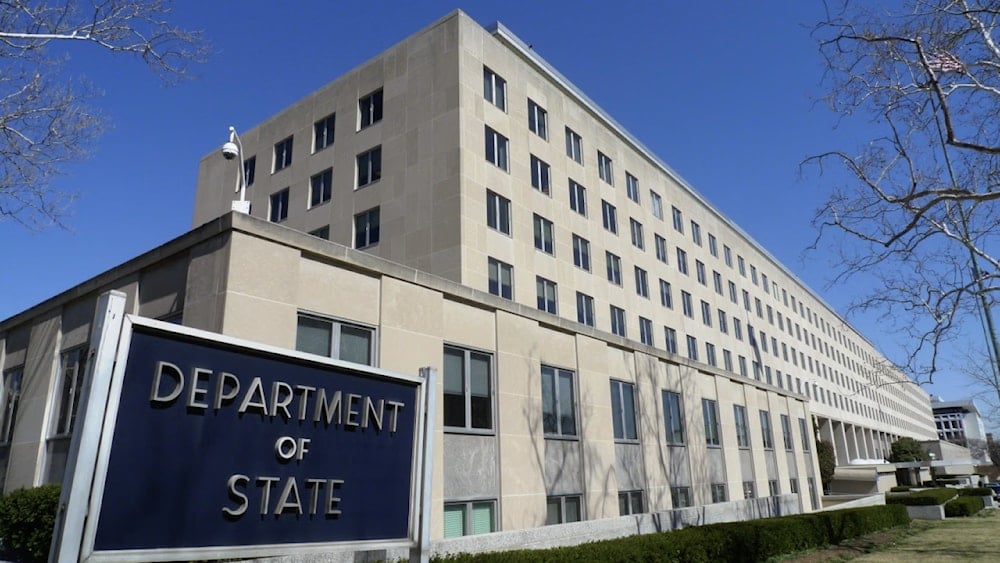US State Department fires official over internal Gaza dispute
Shahed Ghoreishi was fired from the State Department after disputes over forced displacement of Palestinians and pro-'Israel' messaging in Gaza affairs.
-

The Harry S. Truman Building, headquarters for the State Department, is seen in Washington, March 9, 2009 (AP Photo/J. Scott Applewhite)
The US State Department has dismissed its top press officer for Israeli-Palestinian affairs, Shahed Ghoreishi, following a series of internal disputes over public messaging regarding key Trump administration policies.
One of the most contentious issues involved language opposing the forced displacement of Palestinians from the Gaza Strip, otherwise slammed as a plot to ethnically cleanse Palestinians.
The decision came shortly after Ghoreishi proposed a statement to the media asserting that “We do not support forced displacement of Palestinians in Gaza,” a line that reflected past remarks by President Donald Trump and Middle East envoy Steve Witkoff. Despite previous clearance, department leadership blocked the statement, instructing staff to “cut the line marked in red and clear,” according to an internal memo reviewed by The Washington Post.
US officials said Ghoreishi’s removal has sent a chilling message across the department, implying that any deviation from staunch pro-"Israel" language, despite being aligned with official policy, could lead to dismissal.
Controversy over Gaza displacement language
Ghoreishi was reportedly not given an explanation for his termination. He expressed concern that the action raises serious questions about the department's stance on the possible expulsion of Palestinians from Gaza.
“Despite a strong reputation and close working relationship with many of my colleagues, I was unable to survive these disputes,” Ghoreishi said, noting that the language he recommended had been cleared repeatedly since Trump’s inauguration.
The issue of displacement remains highly relevant, with reports emerging that Israeli officials have engaged in talks with South Sudan regarding the relocation of thousands of Palestinians. Experts assert that any such action, under the current humanitarian crisis in Gaza, would constitute ethnic cleansing and a war crime.
Disagreement over Anas al-Sharif’s killing
Tensions further escalated following the targeted killing of Al Jazeera journalist Anas al-Sharif and other media workers in Gaza City by Israeli strikes. While "Israel" alleged al-Sharif was affiliated with Hamas, the network vehemently denied the claim. No similar accusations were made against the journalists killed alongside him.
In response, Ghoreishi proposed a media statement expressing condolences for the journalists’ deaths: “We mourn the loss of journalists and express condolences to their families.” Department leadership rejected the inclusion, responding, “No response is needed. We can’t be sending out condolences if we are unsure of this individual’s actions,” in an email dated August 10.
Tensions with Milstein, pro-'Israel' messaging
One of Ghoreishi’s most vocal critics within the department was David Milstein, senior adviser to Mike Huckabee, the US ambassador to "Israel". Known for his aggressive defense of the Israeli government, Milstein often inserted himself into departmental matters beyond his official scope, according to officials.
Milstein had previously clashed with colleagues when attempting to issue a statement under Secretary of State Marco Rubio’s name condemning Ireland for considering a ban on trade with illegal "Israeli" settlements in the West Bank. Diplomats overseeing European affairs successfully blocked the statement, favoring behind-the-scenes diplomacy.
West Bank vs. 'Judea and Samaria'
Another point of contention arose when Milstein pushed for the department to adopt the term “Judea and Samaria,” the biblical name used within "Israel" to describe the West Bank. Ghoreishi intervened, replacing the term with “West Bank” in official communication regarding House Speaker Mike Johnson’s visit to the region, while referring further media inquiries to Johnson’s office.
A memo drafted by Milstein praised Johnson for “making history as the highest-ranking U.S. official and first speaker of the House to ever go to Judea and Samaria.” Ghoreishi managed to substitute the phrase with previously approved terminology.
Reactions, broader implications
Ghoreishi’s dismissal sparked debate over the Trump administration’s internal messaging on Middle East policy. Supporters within the department rejected the notion that Ghoreishi acted against Trump’s agenda. One official noted his alignment with public messaging strategies, pointing out that Ghoreishi authored the statement, “Make Gaza Beautiful Again,” attributed to Secretary Rubio.
Ghoreishi himself reaffirmed his belief in Trump’s broader Middle East vision. “Trump called out neocons and Western interventionists for failing the Middle East, and claimed he wanted to help pave a new path for the region,” he said. “The hawks on the seventh floor of the State Department do not match that vision.”
The department’s seventh floor includes the offices of Rubio and other top officials.
On Wednesday, Ghoreishi became the subject of an attack by far-right commentator Laura Loomer, an informal Trump ally. On social media, she referred to Ghoreishi as a “Pro-Iranian Regime Jihadi Muslim Tied To NIAC,” referencing his internship at the National Iranian American Council in 2013.
Read more: Palestinians won't accept US path the undermines their rights: Hamas

 5 Min Read
5 Min Read










